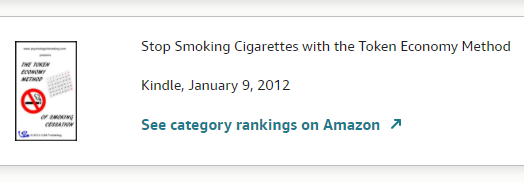
It was ten years ago today that VJM Publishing launched our first book on Amazon. Titled Stop Smoking Cigarettes with the Token Economy Method, it is a short Kindle book describing how to use a clinical psychology technique known as the token economy method to overcome cravings for tobacco cigarettes. It hasn’t sold many copies, but it has two 5-star reviews, showing that it greatly helped at least two people.
Since then, we have published 15 other books on Amazon, all of which are available in paperback form as well as Kindle (see sidebar to right). In general, these books have received good reviews, especially the most recent one, Clown World Chronicles, which has a 4.5-star rating across GoodReads and Amazon.
All in all, the last ten years have been pretty good for VJM Publishing. We have produced a decent number of high-quality books, but have been hampered by a lack of the funds necessary to promote our work in today’s pay-for-play media landscape. The way forward from here will be about finding new ways to bring our work to a wider audience.
The plan for the next ten years is to keep producing quality books and to keep building our company reputation. We are already shadowbanned from both FaceBook and Google, banned outright from most Reddit subs and the mainstream media will never feature us, so we have two major strategies to stay relevant over the next decade.
The first strategy is to prioritise alt tech.
Getting shadowbanned from our erstwhile main sources of traffic has been difficult. Luckily, there are alternatives. The main alternative has been podcasting: VJM has already made multiple appearances on the Jackson Fowler podcast, the Chad Chaddington podcast, and the Bobbing Along podcast. Not only that, but we have also started our own VJM Publishing podcast!
Apart from the podcasts, we’ve been able to establish a decent presence on Gab, and have just expanded into Telegram. The Gab presence has been particularly fruitful, as our posts there regularly get more reactions, comments and shares than on FaceBook, despite that we only have one-eighth of the subscribers on Gab. Alt tech today is as reluctant to ban wrongthinkers as FaceBook and Google were ten years ago, so we will use them more in the future.
The second strategy is to expand in meatspace. This involves two sub-strategies.
The first sub-strategy is to buy land that can be used as a physical base for operations – a literal asylum in the mountains. This involves increasing VJM Publishing’s income over the next ten years to the point where we can afford the land and, once the land is purchased, to establish a temple and monastery dedicated to Elementalism.
Elementalism is the name given to the religion we launched with the publication of our book Elemental Elementalism. This was founded as a Dharmic religion for the Age of Aquarius, one which promulgated the perennial spiritual truths that have been mostly forgotten after the twin onslaughts of the Abrahamic death cults and nihilistic materialistic atheism.
Elementalism needs a physical space that can serve as a holy ground for followers of this religion, the religion of the new age of the world. It is to achieve that end that VJM Publishing intends to raise $2,000,000 over the next 10 years. The goal is to buy a secluded campground somewhere that can serve as a temple and monastery.
With a temple and monastery established, VJM Publishing will be in a position to take in spiritually-minded people who can’t find a place in Clown World. These people will be able to stay at this holy ground and help work towards providing spiritual truth and solace to the benighted masses of the world.
The second sub-strategy is to sell copies of Elemental Elementalism in the street.
This will involve a kind of spiritual evangelism, not like the Abrahamic crusaders and jihadists, but like Socrates’s effort to enlighten his fellow Athenians. Here we will strike up discussions with passing citizens, and debate them about philosophy, in an effort to shine a light upon the ignorance of the modern age.
With copies of Elemental Elementalism in hand, VJM Publishing will take to the streets to spread the truth about the nature of reality and the Good News of Elementalism to as wide an audience as possible. The Good News of Elementalism is the doctrine that Clown World so desperately needs. Although we expect to encounter massive opposition, as Socrates did, we know that the truth will win in the end, as it always does.
The next ten years will see the religion of Elementalism take root and expand all over the world. We will be pushing it as hard as possible from our offices here in New Zealand, working towards the goal of acquiring enough money to buy land for our temple and monastery. Herein we intend to follow in the footsteps of Pythagoras, who established a philosophical monastery ancient Greece.
This second sub-strategy supports the first. It will be through demonstrating the power and truth of Elementalism through street evangelism that we are most likely to encounter a generous donor with the wealth necessary to help us buy land. Promoting Elemental Elementalism is the most effective way to light a fire in the soul of such a person.
In summary, the next ten years of VJM Publishing operations will be similar to the first in the sense that we will focus on producing quality informational material and promoting this to the masses. But they will be different in the sense that we will explore alternative methods of promotion, as well as developing real estate in the physical world instead of just online.
*
If you enjoyed reading this essay/article, you can get a compilation of the Best VJMP Essays and Articles of 2020 from Amazon for Kindle or Amazon for CreateSpace (for international readers), or TradeMe (for Kiwis). A compilation of the Best VJMP Essays and Articles of 2019, the Best VJMP Essays and Articles of 2018 and the Best VJMP Essays and Articles of 2017 are also available.
*
If you would like to support our work in other ways, subscribe to our SubscribeStar fund. Even better, buy any one of our books!



